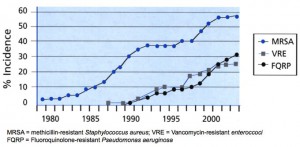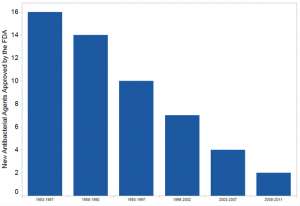Superbugs, Antibiotic Resistance, and Lots of Pain →
These two charts are very scary. "The first shows the rise of antibiotic resistance in various common infections. The second shows the decline in the approval of new antibiotics."
These are not two trends you want to see moving in opposite directions.
There are a lot of reasons for the decline of new antibiotics--the market incentives are hopelessly misaligned, we've already picked a lot of the low-hanging fruit, and we're using way more antibiotics than we should in both humans and in animals. But anything we do to reduce overusage actually makes the problem of new antibiotic development worse, because it reduces the potential profit. At any rate, there's no clear way to solve this terrible divergence.
I've been talking about this problem for a while, but I've mostly thought about things like the ear infections that would have left me deaf before the advent of penicillin, or people dying in childbirth. I didn't start to understand the radical implications that antibiotic resistance has for health care practice until I read the absolutely gripping Rising Plague, by an infectious disease specialist who points out just how much of modern medicine is dependent on being able to control bacterial infection.
...
Infectious mortality will go up, reducing our costs for longer, more expensive diseases--and making people less willing to undergo marginal surgeries.
On the other hand, when the first-line antibiotics fail, the second line means admitting people to the hospital for intravenous antibiotics. This is obviously much more expensive than giving them a pill, even if we make all the doctors take pay cuts and use the awesome monopsony power of the federal government to buy all our antibiotics at a discount. We might be able to worry less about those huge health care costs in 2060--but we might need to worry a lot more about our health care costs in the next twenty or thirty years.
....
Of course, the most worrying thing is not the effect on the budget. It's the effect on the people. A world without antibiotics is a world of vast suffering and early death.

